When it comes to research methods or research methodologies, there can be a lot of unfamiliar terms and concepts to get to grips with. One question we’re often asked by masters business students is how to find empirical and methodological research articles. It’s a good question as it can be quite tricky to locate articles on these topics, so here’s some advice on how you can go about searching for them in Library Search and the databases that we subscribe to.

What is the difference between empirical and methodological research?
Let’s start by defining our key terms, so we know what to look out for:
Empirical research
Empirical research is based on observed and measured phenomena and derives knowledge from actual experience rather than from theory or belief.
How do you know if a study is empirical? Read the subheadings within the article, book, or report and look for a description of the research methodology. Ask yourself: Could I recreate this study and test these results?
Key characteristics to look for:
- Specific research questions to be answered
- Definition of the population, behaviour, or phenomena being studied
- Description of the process used to study this population or phenomena, including selection criteria, controls, and testing instruments (such as surveys)
Another hint: some scholarly journals use a specific layout, called the “IMRaD” format, to communicate empirical research findings. Such articles typically have 4 components:
- Introduction: sometimes called “literature review” — what is currently known about the topic — usually includes a theoretical framework and/or discussion of previous studies
- Methodology: sometimes called “research design” — how to recreate the study — usually describes the population, research process, and analytical tools
- Results: sometimes called “findings” — what was learned through the study — usually appears as statistical data or as substantial quotations from research participants
- Discussion: sometimes called “conclusion” or “implications” — why the study is important — usually describes how the research results influence professional practices or future studies
Thank you to Penn State University for their description of empirical research: https://guides.libraries.psu.edu/emp
Methodological research / study
According to Mbaugbaw et al., a methodological study will:
“…evaluate the design, analysis or reporting of other research-related reports […] They help to highlight issues in the conduct of research with the aim of improving […] research methodology, and ultimately reducing research waste (2020, p.1).
In simple terms, it’s research on research!
Key characteristics to look for:
- Will have the term ‘methodological research’ or ‘methodological study’ in the title or abstract.
- Has more of a focus on the method(s) employed to do the research (e.g. interviews, questionnaires) rather than the findings of the research.
- Evaluates how research was done and how the methodology could be improved.
How to find empirical and methodological research articles in Library Search and databases
Finding these research articles isn’t always easy, but it can be done! While they are indexed in most databases, it can sometimes be tricky to find them because of the wide variety of names used for these type of studies (methodological research can also be known as research-on-research, meta-research, meta-epidemiological studies etc.).
First, watch this short video that goes through how to find empirical and methodological research articles:
Here’s our top tips for finding empirical and methodological research articles:
Searching via journal titles
The easiest way to find these journal articles is to target journals that are focused on research methods, then search or browse within those titles.
Here’s some examples of such journal titles to help you find methodological studies:
- International Journal of Social Research Methodology
- Organizational Research Methods
- The International Journal of Qualitative Methods
- Methodology
- Qualitative Research
I recommend that you search for these titles in Library Search under ‘Everything except articles’ filter:

Within these titles I recommend searching for “methodological study” in the abstract:
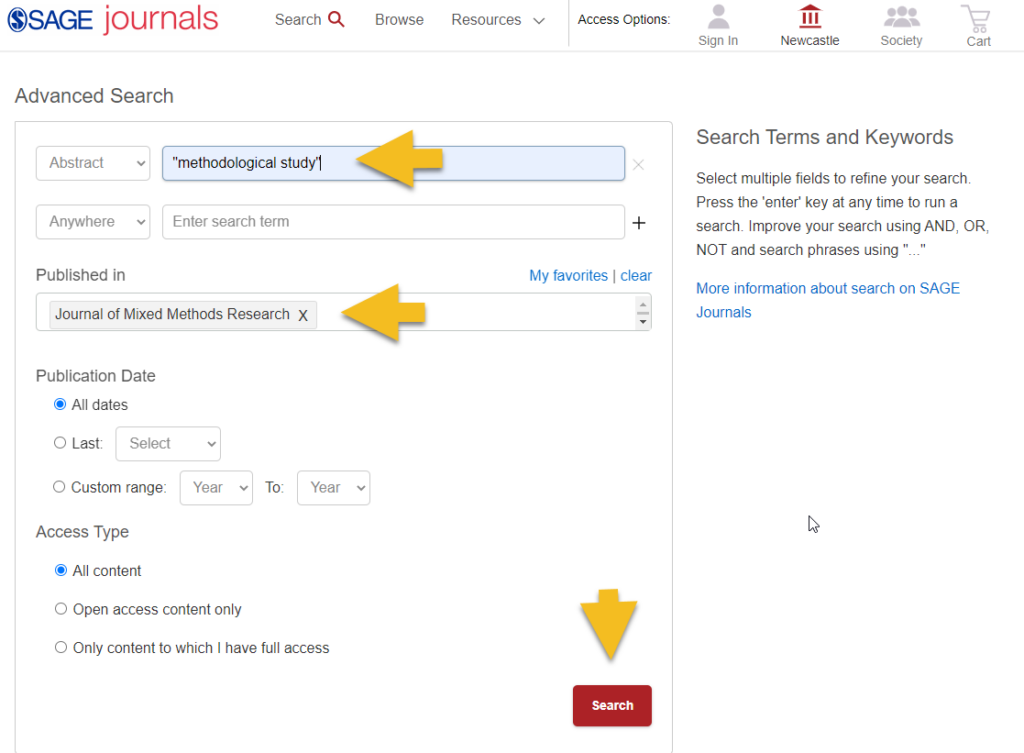
To find empirical research articles, you would go to top, peer-reviewed, research journals in your field of study (the list is endless!) and search within these using relevant keywords.
Here are some key journal titles in the field of business:
- The International Journal of Human Resource Management
- Journal of International Business Studies
- Work, Employment and Society
- Organization Studies
- Academy of Management Journal
You then need to search within these journal titles, ideally within the abstract, for keywords relating to the research design / method ( i.e. how the researcher collected their empirical research) So you might search for terms such as interview*, survey*, questionnaire* or “focus group*” :

Searching via keyword in Library Search and databases
If you aren’t finding enough when searching within journal titles, broaden your search by looking within Library Search and other suitable databases.
The Advanced Search within Library Search is a good place to start. Again, try to search for keywords such as “methodological study”, or by method, e.g., interview*, survey*, questionnaire* or “focus group*”, along with your subject topic. Remember to use the filters if you need to find research within a particular time frame, such as the last 10 years and to change the drop down to search “everything”.
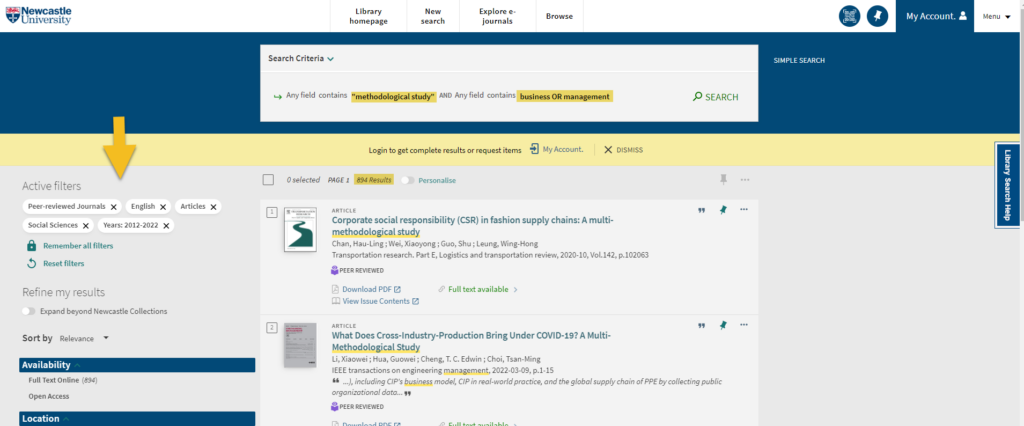
If you are looking within Scopus or subject specialist databases, such as Business Source Complete, the process is exactly the same. If your search isn’t working, try different keywords, but persevere as the research is there, it just might be hiding:
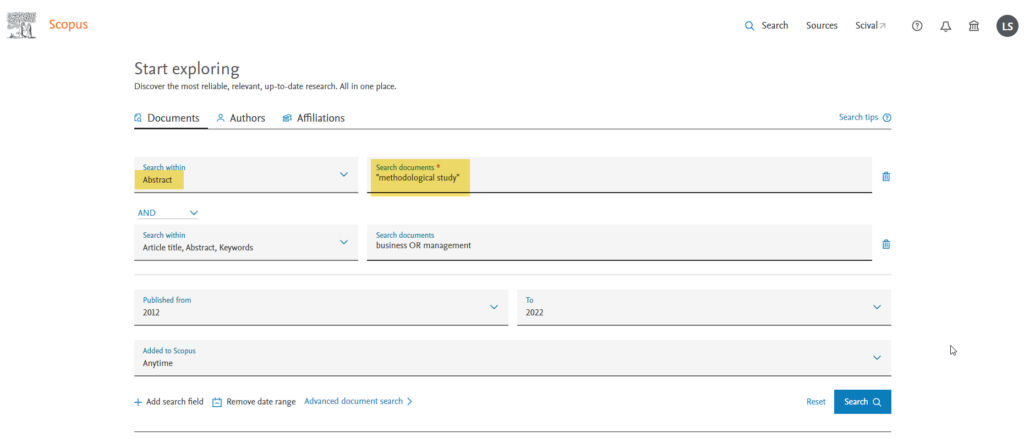
Searching with controlled vocabulary / subject headings
Some of our databases use controlled vocabulary (a thesaurus), this allows you to identify the preferred terms used in a particular database for your topic of interest, making it easier to find relevant articles. Here is a worked example using controlled vocabulary in Business Source Complete:
I tried a search for “empirical research”, and found it is a preferred term within this database:

Clicking on this preferred term allows you to explore any related or narrower terms, which you can choose to add to your search to improve the quality of your results:

I decided to add Empirical research and the related term Quantitative research to my search, clicking add to include them in my search string:
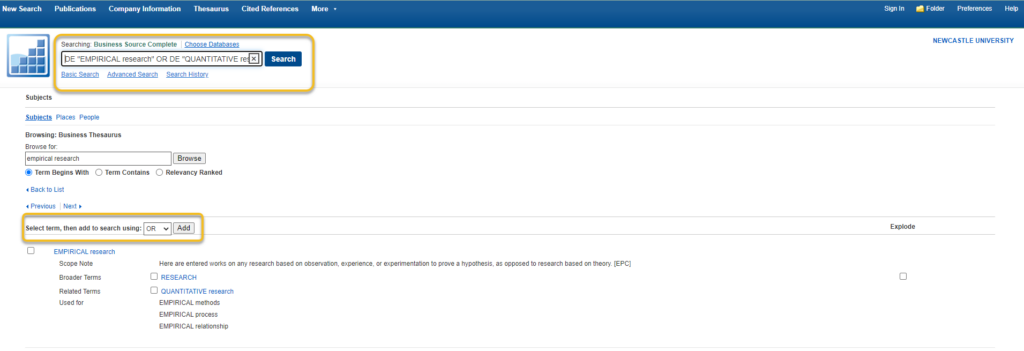
I can then add subject related terms to my search:
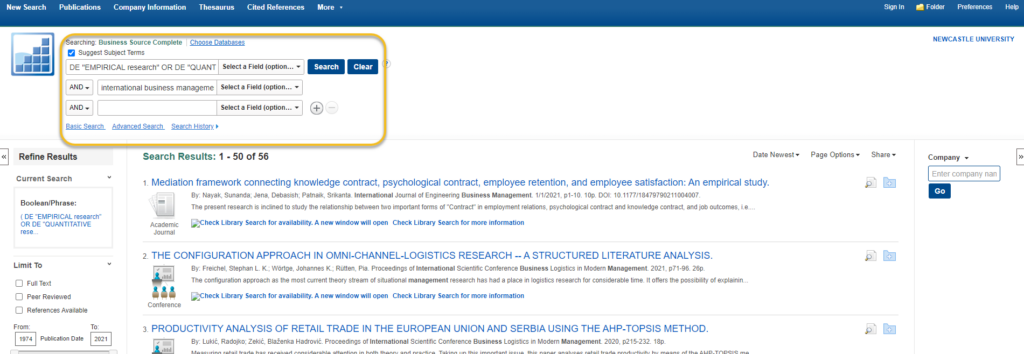
Many of the social sciences databases have a thesaurus that you can search within.
SAGE Research Methods
For further help on topic of research methods and methodologies, check out SAGE Research Methods. This is a database containing thousands of resources, dedicated to the subject area of Research Methods. It supports all stages of the research process including: writing a research question, conducting a literature review, choosing the best research methods, analysing data, to writing up your results and thinking about publication. It contains information suited to all levels of researchers, from undergraduates starting your first project to research associates. Within the resource, you can access dictionary and encyclopaedia entries, book chapters, full books, journal articles, case studies, some datasets and video. There are many uses for the resources you will find in SAGE Research Methods:
- get a quick explanation of a term or concept in a dictionary or encyclopaedia entry
- access a full overview of a qualitative and quantitative methods, theory or approach in a specialist book
- use an e-book chapter that covers a specific method in more detail for your methodology chapter or when choosing how to approach your research
- access a journal article that illustrates the real world application of the methods in research
Access the SAGE Research Methods User Guide for an overview of the resource, and use the tabs below to access videos and training materials to get started.
To access SAGE Research Methods, either:
- find it on Library Search (Links to an external site.)
- visit the the journals and databases section of your Subject Guide
I hope you have found this useful. I’m sorry there isn’t an easy way for finding such articles, however, a thorough and systematic search within journal titles, Library Search and databases will allow you to find some relevant and good quality articles that you can use in your research.
If you need further help with this topic or something similar, please make an appointment with your Liaison Librarian.
References
Mbuagbaw, L., Lawson, D. O., Puljak, L., Allison, D. B. and Thabane, L. (2020) ‘A tutorial on methodological studies: the what, when, how and why’, BMC Medical Research Methodology, 20(1). Available at: https://bmcmedresmethodol.biomedcentral.com/articles/10.1186/s12874-020-01107-7 (Accessed: 15 June 2022).
